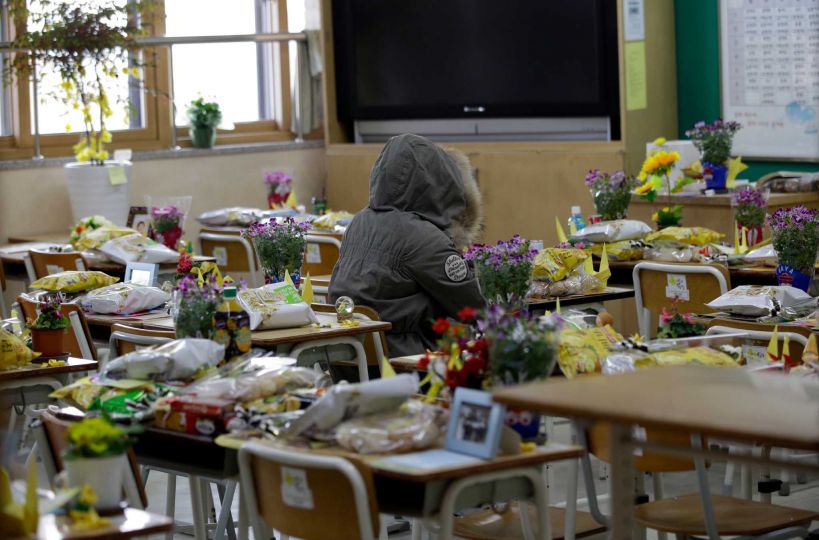- California Assembly OKs highest minimum wage in nation
- S. Korea unveils first graphic cigarette warnings
- US joins with South Korea, Japan in bid to deter North Korea
- LPGA golfer Chun In-gee finally back in action
- S. Korea won’t be top seed in final World Cup qualification round
- US men’s soccer misses 2nd straight Olympics
- US back on track in qualifying with 4-0 win over Guatemala
- High-intensity workout injuries spawn cottage industry
- CDC expands range of Zika mosquitoes into parts of Northeast
- Who knew? ‘The Walking Dead’ is helping families connect
Teacher’s suicide after ferry disaster not death on duty: Top court

FILE — In this picture taken on Wednesday, April 8, 2015, an alumna sits in a victim’s chair inside a classroom at Danwon High School in Ansan, south of Seoul, South Korea. One year ago the ferry Sewol carrying 325 second-year students on a field trip to a southern island sank; only 75 survived. Their classrooms in this city about an hour south of Seoul have barely changed from the day they left for the trip. (AP Photo/Lee Jin-man)
SEOUL (Yonhap) — South Korea’s top court dismissed an appeal filed by the bereaved family of a former vice principal of a local high school, who committed suicide after many of his students died in a ferry disaster in 2014, court records showed Thursday.
The 6,825-ton ferry Sewol sank in waters off the country’s southwestern coast and left 304 people dead. Most of the deaths involved high school students on a field trip to Jeju Island.
Kang Min-kyu, the senior teacher from Danwon High School who was in charge of the students and survived the disaster, hanged himself shortly after he was rescued, saying he could not bear to live when so many of his students were dead or missing.
His family filed a suit against the personnel management minister, demanding Kang’s death be recognized as a line of duty death, which would allow his family to be paid special compensation.
The Supreme Court, upholding a lower court’s ruling, said Kang’s death does not fall under the official line of duty death as defined in the country’s public officials pension act.
Under that law, people who died on duty are those who are killed while saving a life at the risk of their own.
Citing experts comments, the court said Kang’s death mainly stemmed from survivor syndrome, a kind of a post-traumatic stress disorder.
“The syndrome seems to have originated from emotional shock and a guilty conscience about surviving from the disaster,” the court said.
The court said seven other teachers who were classified as having died in the line of duty, were confirmed by survivors to have engaged in life-saving activities.












![일본 사도광산 [서경덕 교수 제공. 재판매 및 DB 금지]](http://www.koreatimesus.com/wp-content/uploads/2024/07/PYH2024072610800050400_P4-copy-120x134.jpg)


